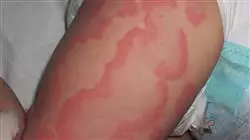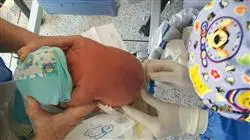University certificate
The world's largest faculty of medicine”
Introduction to the Program
Improve your knowledge in Pediatric Infectious Diseases through this program, where you will find the best teaching material with real clinical cases. Learn here about the latest advances in the specialty to be able to perform a quality medical practice"

At the diagnostic level, the increasingly frequent availability of new techniques allows a more rapid etiological diagnosis or by complementary techniques that require clinical diagnostic orientation such as ultrasound, computed tomography or magnetic resonance imaging. Without forgetting the support that the clinician has in laboratory tests that determine acute phase reactants such as procalcitonin or C-reactive protein, which are sometimes given excessive importance, forgetting that we treat patients and not laboratory results.
All this means that, in order to attend these patients with the maximum guarantee, the clinicians must maintain a continuous preparation, even if they are not specialists, since, as we have mentioned, the percentage of visits or interconsultations related to the infection is very high. If we add to this the increasing amount of information provided by parents, sometimes not always contrasted, professional updating becomes essential to be able to provide adequate information according to the current scientific evidence at all times.
Parents who refuse vaccines, children from war-torn or low-income countries, infections in transplant patients, children with devices, fevers without a focus in children well vaccinated with existing vaccines, use of immunomodulatory therapies are increasingly common situations that we must deal with and provide a rapid response to.
Update your knowledge through the Professional master’s degree in Pediatric Infectious Diseases"
This Professional master’s degree in Pediatric Infectious Diseases contains the most complete and up-to-date scientific program on the market. The most important features of the program include:
- Development of more than 75 clinical cases presented by experts in pediatric infectious diseases. The graphic, schematic, and practical contents with which they are created provide scientific and practical information on the disciplines that are essential for professional practice
- Diagnostic and therapeutic innovations on assessment, diagnosis and treatment in Pediatric Infectious Diseases
- It contains practical exercises where the self-assessment process can be carried out to improve learning
- Clinical and radiological imaging iconography with at-a-glance diagnosis presentation
- An algorithm-based interactive learning system for decision-making in the clinical situations presented throughout the course
- With special emphasis on evidence-based medicine and research methodologies in pediatric infectious diseases
- All of this will be complemented by theoretical lessons, questions to the expert, debate forums on controversial topics, and individual reflection assignments
- Content that is accessible from any fixed or portable device with an internet connection
This Professional master’s degree may be the best investment you can make when selecting a refresher program, for two reasons: in addition to updating your knowledge in Pediatric Infectious Diseases, you will obtain a qualification endorsed
by TECH Global University"
Its teaching staff includes professionals belonging to the field of Pediatric Infectious Diseases, who bring to this specialization the experience of their work, in addition to recognized specialists belonging to leading scientific societies.
Thanks to its multimedia content developed with the latest educational technology, they will allow the professional a situated and contextual learning, that is to say, a simulated environment that will provide an immersive learning programmed to train in real situations.
The design of this program is based on Problem-Based Learning, by means of which the physician must try to solve the different professional practice situations that arise during the academic year. For this purpose, the physician will be assisted by an innovative interactive video system developed by renowned experts in the field of Pediatric Infectious Diseases with extensive teaching experience.
Increase your confidence in decision-making by updating your knowledge through this Professional master’s degree”

Make the most of this opportunity to learn about the latest advances in Pediatric Infectious Diseases and improve your patient’s care"
Why study at TECH?
TECH is the world’s largest online university. With an impressive catalog of more than 14,000 university programs available in 11 languages, it is positioned as a leader in employability, with a 99% job placement rate. In addition, it relies on an enormous faculty of more than 6,000 professors of the highest international renown.

Study at the world's largest online university and guarantee your professional success. The future starts at TECH”
The world’s best online university according to FORBES
The prestigious Forbes magazine, specialized in business and finance, has highlighted TECH as “the world's best online university” This is what they have recently stated in an article in their digital edition in which they echo the success story of this institution, “thanks to the academic offer it provides, the selection of its teaching staff, and an innovative learning method aimed at educating the professionals of the future”
A revolutionary study method, a cutting-edge faculty and a practical focus: the key to TECH's success.
The most complete study plans on the university scene
TECH offers the most complete study plans on the university scene, with syllabuses that cover fundamental concepts and, at the same time, the main scientific advances in their specific scientific areas. In addition, these programs are continuously being updated to guarantee students the academic vanguard and the most in-demand professional skills. In this way, the university's qualifications provide its graduates with a significant advantage to propel their careers to success.
TECH offers the most comprehensive and intensive study plans on the current university scene.
A world-class teaching staff
TECH's teaching staff is made up of more than 6,000 professors with the highest international recognition. Professors, researchers and top executives of multinational companies, including Isaiah Covington, performance coach of the Boston Celtics; Magda Romanska, principal investigator at Harvard MetaLAB; Ignacio Wistumba, chairman of the department of translational molecular pathology at MD Anderson Cancer Center; and D.W. Pine, creative director of TIME magazine, among others.
Internationally renowned experts, specialized in different branches of Health, Technology, Communication and Business, form part of the TECH faculty.
A unique learning method
TECH is the first university to use Relearning in all its programs. It is the best online learning methodology, accredited with international teaching quality certifications, provided by prestigious educational agencies. In addition, this disruptive educational model is complemented with the “Case Method”, thereby setting up a unique online teaching strategy. Innovative teaching resources are also implemented, including detailed videos, infographics and interactive summaries.
TECH combines Relearning and the Case Method in all its university programs to guarantee excellent theoretical and practical learning, studying whenever and wherever you want.
The world's largest online university
TECH is the world’s largest online university. We are the largest educational institution, with the best and widest online educational catalog, one hundred percent online and covering the vast majority of areas of knowledge. We offer a large selection of our own degrees and accredited online undergraduate and postgraduate degrees. In total, more than 14,000 university degrees, in eleven different languages, make us the largest educational largest in the world.
TECH has the world's most extensive catalog of academic and official programs, available in more than 11 languages.
Google Premier Partner
The American technology giant has awarded TECH the Google Google Premier Partner badge. This award, which is only available to 3% of the world's companies, highlights the efficient, flexible and tailored experience that this university provides to students. The recognition as a Google Premier Partner not only accredits the maximum rigor, performance and investment in TECH's digital infrastructures, but also places this university as one of the world's leading technology companies.
Google has positioned TECH in the top 3% of the world's most important technology companies by awarding it its Google Premier Partner badge.
The official online university of the NBA
TECH is the official online university of the NBA. Thanks to our agreement with the biggest league in basketball, we offer our students exclusive university programs, as well as a wide variety of educational resources focused on the business of the league and other areas of the sports industry. Each program is made up of a uniquely designed syllabus and features exceptional guest hosts: professionals with a distinguished sports background who will offer their expertise on the most relevant topics.
TECH has been selected by the NBA, the world's top basketball league, as its official online university.
The top-rated university by its students
Students have positioned TECH as the world's top-rated university on the main review websites, with a highest rating of 4.9 out of 5, obtained from more than 1,000 reviews. These results consolidate TECH as the benchmark university institution at an international level, reflecting the excellence and positive impact of its educational model.” reflecting the excellence and positive impact of its educational model.”
TECH is the world’s top-rated university by its students.
Leaders in employability
TECH has managed to become the leading university in employability. 99% of its students obtain jobs in the academic field they have studied, within one year of completing any of the university's programs. A similar number achieve immediate career enhancement. All this thanks to a study methodology that bases its effectiveness on the acquisition of practical skills, which are absolutely necessary for professional development.
99% of TECH graduates find a job within a year of completing their studies.
Professional Master's Degree in Pediatric Infectology
The transmission of infectious diseases in children can occur from gestational age to early childhood, where it is important to identify the severity of these and the existing variants at the time of finding an appropriate treatment, in order to minimize the risks to the patient. Direct observation and the use of laboratory tools allow us to have an accurate orientation of the types of microorganisms present in the health complications of each child. That is why in TECH Global University we designed a Professional Master's Degree in Pediatric Infectious Diseases for graduates to understand the basics and elements in this area of medicine, and thus improve the quality of life of many; delving into the most common infections and avoiding long-term damage. This academic plan is designed to be carried out through the e-learning methodology, which is a learning model that contains all its subject matter asynchronously and offline possibility thus generating flexibility in the schedule and place of study.
Study an Online Professional Master's Degree in Infectious Diseases in children
This program is developed over a year and consists of more than ten modules, which delves into the current outlook in infectious diseases, the laboratory in the diagnosis of these pathologies, infection in the neonatal period, in ocular areas, skin, soft tissue, and skeletal system, respiratory, gastrointestinal, urinary, HIV in pediatrics and preventive measures, among other topics. All of the above was designed with the objective of providing updated knowledge that will allow to practice and intervene in the prevention, diagnosis and treatment of clinical cases. Equally important, there will be outstanding teachers in the field of pediatric health, both in research and pedagogy, and various simulated health situations designed for real patients will be shown, where an investigation must be carried out, generating one or multiple hypotheses and ultimately providing a solution to the medical condition that affects children from 0 to 5 years of age.







